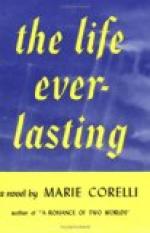“I began at Oxford by playing the slave part,” he said—“a slave to conventions and fossil-methods of instruction. One can really learn more from studying the actual formation of rocks than from those worthy Dons whom nothing will move out of their customary ruts of routine. Even at that early time I felt that, given a man of health and good physical condition, with sound brain, sound lungs and firm nerves, it was not apparent why he, evidently born to rule, should put himself into the leading strings of Oxford or any other forcing-bed of intellectual effort. That it would be better if such an one took himself in hand and tried to find out his own meaning, both in relation to the finite and infinite gradations of Spirit and Matter. And I resolved to enter upon the task—without allowing myself to fear failure or to hope for success. My aim was to discover Myself and my meaning, if such a thing were possible. No atom, however infinitesimal, is without origin, history, place and use in the Universe—and I, a conglomerated mass of atoms called Man, resolved to search out the possibilities, finite and infinite, of my own entity. With this aim I began—with this aim I continued.”
“Your task is not finished, then?” put in Dr. Brayle, with a smilingly incredulous air.
“It will never be finished,” answered Santoris—“An eternal thing has no end.”
There was a moment’s silence.
“Well,—go on, Santoris!” said Mr. Harland, with a touch of impatience,—“And tell us especially what we all of us are chiefly anxious to know—how it is that you are young when according to the time of the world you should be old?”
Santoris smiled again.
“Ah! That is a purely personal touch of inquisitiveness!” he answered—“It is quite human and natural, of course, but not always wise. In every great lesson of life or scientific discovery people ask first of all ‘How can I benefit by it?’ or ’How will it affect me?’ And while asking the question they yet will not trouble to get an answer out of themselves,—but they turn to others for the solution of the mystery. To keep young is not at all difficult; when certain simple processes of Nature are mastered the difficulty is to grow old!”
We all sat silent, waiting in mute expectancy. The servants had left us, and only the fruits and dainties of dessert remained to tempt us in baskets and dishes of exquisitely coloured Venetian glass, contrasting with the graceful clusters of lovely roses and lilies which added their soft charm to the decorative effect of the table, and Santoris passed the wine, a choice Chateau-Yquem, round to us all before beginning to speak again. And when he did speak, it was in a singularly quiet, musical voice which exercised a kind of spell upon my ears—I had heard that voice before—ah!—how often! How often through the course of my life had I listened to it wonderingly in dreams of which the waking morning




